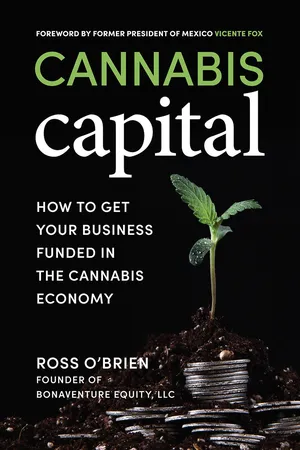![]()
THE CANNABIS ECONOMY LANDSCAPE
![]()
THE CANNABIS ECONOMY
Defining the markets in which a cannabis business operates begins with the foundational concept that cannabis is an economy (in which multiple sectors operate and are impacted) and not an industry that is solely focused on a few related verticals. This concept was touched on in the introduction and may be considered controversial. But there are a number of important reasons to adopt this view for entrepreneurs and investors that have a profound impact when raising capital. Restrictions and prohibitionary laws and regulations have prevented commercial access to cannabis until recently. With the changing regulations, cannabis is rapidly becoming a resource that is now readily available to grow, research, process, and extract elements for widespread applications. This is the catalyst for countless businesses starting up and operating across the entire international supply chain, and in turn impacting and forming industries in their own right.
This transition toward widespread legal access to cannabis is fueling commerce in all facets of industry, much of which is being defined in real time as it happens. If we start from the ground up, quite literally, the cannabis plant is a natural resource in its primary form. The iterations and use cases of this resource will impact countless industries in their own right. From agriculture and farming of this resource and introducing it into the global economy, cannabis will have a permanent and profound impact from education and research to retail and consumer products to nonprofits and government agencies (just to point out a few industries).
A good analogy for what is happening with the growing access to cannabis is to look historically at other resources that were otherwise inaccessible in marketplaces of their day. For example, with the discovery of oil, all facets of commerce were influenced by oil making its way from sourcing, production, transportation, and ultimately into the hands of the consumer. All the existing industries of the day needed to adapt to and accommodate this new resource and the industries it was impacting and influencing from logistics and transportation, innovation and technology, finance and regulations. Today, would you consider the automotive industry part of the oil and gas industry? No, you wouldn’t. Automotive is its own industry, but it is a part of the energy economy that was created through global access to oil. Today, cannabis is reaching all facets of modern industry in a similar way. In short, it is an economy.
DEFINING THE CANNABIS ECONOMY
According to Investopedia, an economy can be defined as “a system of inter-related production and consumption activities converting resources into wealth through systems of trade.” Economies are then segmented into sectors and industries within those sectors. We can then adopt this definition and identify the Cannabis Economy as: “A global system for exchange of goods and services facilitating cannabis-enabled commerce, education, and policy.”
As such, the global introduction of this new resource is so widely applicable that it is impossible to narrow down cannabis to one industry. When viewed as an economy, the benefit to entrepreneurs is the clarity this provides in defining their ventures not in terms of being a business in the cannabis industry, but rather in the context of being in an industry that is part of (or will be part of) the global cannabis economy. The concept of the cannabis economy forms the basis for entrepreneurs and investors to communicate through mutually defined and agreed-upon perspectives. Through the cannabis economy lens, discussions between investors and entrepreneurs can shift away from defining the “cannabis industry” to thinking about “industry of cannabis.” This clears a path to discussing a business opportunity within the framework of the industry it operates within as opposed to being so unique or different that best practices don’t apply.
CANNABIS INDUSTRIES DEFINED
An industry is typically defined by identifying a group of companies that conduct their primary activities within the same primary business activity. These companies are typically classified by their main source of revenue. The system used in North America to classify businesses is called the North American Industry Classification System (NAICS), which uses a code system to identify sectors and industries within the overall economy.
If you take the airline industry as an example, the companies that operate commercial airlines are classified within the primary “Transportation and Warehousing” sector. Within that sector, categories are defined further that include “Scheduled Passenger Air Transportation” (NAICS Code 48111), which includes the companies such as American Airlines Group Inc. whose primary business function is to provide air transportation for passengers or freight.
If you look more closely at American Airlines, they categorize their core sources of revenue as main and regional passenger ticket sales, cargo, and “other.” This “other” category is where they capture revenue generated from their loyalty and frequent flyer programs, which can be as much as 12 percent of revenue. Selling programs, such as credit cards, is arguably one of the most profitable sources of revenue for the company. Would you consider American to be an airline or a credit card company? Who is their customer?
This is an interesting debate and no more relevant than in the cannabis economy today. If we take the time to identify sectors and industries in a similar way within the cannabis economy, the operating metrics for success become more explicit.
Figure 1.1 applies a traditional hierarchy for defining the sectors and industries within the global cannabis economy. Within each sector, we can group together the companies that will make up an explicit industry. These are the companies that have a common source of revenue and business activity.
Now that we have a series of identified industries, it becomes obvious that none of these industries are in fact new, but rather are just now being impacted and adapting to the introduction of access to cannabis. Where does your company operate? Is your core expertise in understanding cannabis either technically from a regulatory and compliance perspective, philosophically, or do you otherwise have expertise within that sector and industry independent of a working knowledge of cannabis?
FIGURE 1.1—The Cannabis Economy Hierarchy
A foundational approach to business is to not fall into the trap of throwing out best practices for the sake of rushing to defining cannabis as something separate from the industries it is impacting. You should avoid assuming that experience in other industries won’t bring value to a cannabis company, as leveraging historical successes in non-cannabis industries will indicate a high probably of success in your venture. So don’t be in a rush to throw out entrepreneurial disciplines and experiences under the assumption that cannabis businesses can’t be defined in a traditional sense.
When participants in an emerging sector rush forward without taking the time to identify the foundational elements, markets become temporarily inflated. Irrational exuberance of public investors is a likely predictor that many companies will ultimately fail, and investors will lose their capital. This is true across all industries and we should not expect cannabis to be any different.
Every aspect of managing a business should be informed by a clear understanding of the industry a company operates within. This frames sales and marketing strategies, pricing and product development, supply chain and infrastructure, partners and competitors, and compliance with related rules and regulations. These are the drivers that form the basis of a well-thought-out business plan. Throughout this book, I’ll repeat that it is your mission first to build a great business and then adapt that model to a core cannabis strategy.
THE CANNABIS ECONOMY AND YOUR VENTURE
The danger in defining cannabis as an industry is that it implies that there is some special skillset that requires a deep understanding of cannabis. This idea implies that if cannabis is an industry unto itself, only insider experts understand it. It is true that experience matters and industry knowledge is critical to success. It is common, however, that insiders and outsiders focus on and emphasize cannabis over business fundamentals. This skews the discussion and thinking away from a foundation in building businesses based on first principles of company management (which will be discussed in greater detail in Chapter 7). We can avoid that trap by thinking first about what a well-run company needs to be successful, then apply the nuances of cannabis.
It’s time to move beyond the concept that only a chosen few understand cannabis. Yes, there is real merit and value in domain expertise, but this tends to be an excuse for entrepreneurs or operators to forego foundational business practices. This is where the communication between inventors and entrepreneurs begins to break down. If an entrepreneur dismisses feedback from investors as being uniformed as to the nuances of cannabis (which is a symptom of referring to it as an industry), then they likely won’t be open to listening to the feedback and evaluating the business on the merits of how it is being run.
Of course, cannabis is unique in that new precedents are being set, new operating procedures are being designed, and new innovations are happening everywhere you look. If you step back and explore the history of each sector within the cannabis economy, this has happened throughout time with new innovations, technologies, and changes in regulations impacting the global economy. For example, in the U.S., travel and tourism went through a deregulation in 1978, and similarly in 1996 telecommunications was impacted. The industrial revolution started a global introduction of regulations and government oversight of emerging industries. In each of those situations, many businesses were adversely affected, but opportunity was created for new innovations in technology and systems.
Every industry has its own unique generational precedents of successes and failures that every business owner can learn from. By adopting the cannabis economy as the macro marketplace, you can break away from the confines of thinking that there is some secret knowledge that only a few can have. Yes, as with any venture, market knowledge is critically important. But the foundational business acumen and an understanding of how economies and the industries within them work is a skill and perspective at the core of great entrepreneurs and CEOs throughout history.
Operating a business requires an acknowledgement of the constraints that define the boundaries that a company operates within. Constraints are a positive thing when planning and building a business, in that it requires focus and discipline to build within set parameters. Only a clear view of those boundaries will allow you to strategically push those same boundaries and reframe them over time.
THE CANNABIS ECONOMY’S IMPACT ON RAISING CAPITAL
The complexities of the cannabis economy are important—as much so as the operational knowledge you need to succeed. So it’s important to familiarize yourself with how the cannabis economy affects the investment process.
Communication starts with alignment, and taking the time to define the cannabis economy and the industry your business operates in will allow you to move beyond the disconnect quickly and get to a discussion of why your business will succeed. Remember that most companies fail, and investors are on the lookout for failure points (risk), so creating a common ground for communication is imperative to advancing the discussion with an investor.
Investors arrive at a point in their careers where they can invest capital in companies largely because they have been successful in building wealth through entrepreneurship in the past. Pitching to them can be akin to moving up to the major league from the minors. One of the foundational approaches to pitching well is to understand the investors’ perspectives and be able to create common views. Being able to demonstrate a sophisticated understanding of operations and management is as important to investors as showing that you understand cannabis. With the investors’ likely track record of success as entrepreneurs, they will look for indications of how you think about building your company and if those best practices and tactical approaches match their understating of how that maps to success.
The surging investments in cannabis reflect the growing recognition of ...



